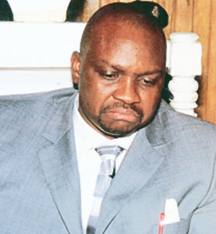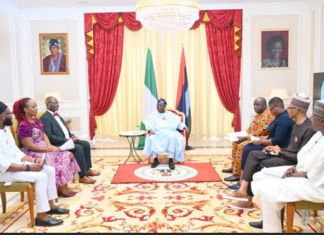Assistant Editor (South West), MUYIWA OLALEYE, writes that the politics in Ekiti State before and after the June 21 governorship election persists, even with inauguration of Ayo Fayose as governor.
 Though gone, June 21 Ekiti governorship election remains an exercise that will linger in the state, especially going by its outcome which came to many as a surprise. In it, a sitting governor, Dr. Kayode Fayemi of the All Progressives Congress (APC), was trounced by one-time governor, Ayodele Fayose, of the Peoples Democratic Party (PDP).
Though gone, June 21 Ekiti governorship election remains an exercise that will linger in the state, especially going by its outcome which came to many as a surprise. In it, a sitting governor, Dr. Kayode Fayemi of the All Progressives Congress (APC), was trounced by one-time governor, Ayodele Fayose, of the Peoples Democratic Party (PDP).
Incidentally, this is not Fayose’s first time of presiding over the affairs of Ekiti.
His first election was in 2003. But he was removed in 2006, in controversial circumstances. The governor’s return has been described as being unique in many aspects.
Part of the uniqueness was that the governor and his predecessor achieved rare feats through the last governorship election. Fayemi, a notable academic and an avowed rights activist during the military era, achieved a rare feat in 2010 when he snatched power from then Governor Segun Oni of the then PDP.
Oni had earlier been declared winner of the 2007 governorship election. But Fayemi, who had contested on the platform of the defunct Action Congress (AC), took the matter to court, where he eventually secured victory.
Fayemi took the oath of office on October 16, 2010, the day after the Court of Appeal in Ilorin, Kwara State, declared that he was the winner of the 2007 election in Ekiti.
Fayose, on the other hand, also has some electoral feats. The first time he emerged as a governor in 2003, he defeated sitting governor, Adeniyi Adebayo, then of the Alliance for Democracy (AD). He left the office on October 16, 2006, in controversial circumstances, including a hotly contested impeachment that remained a source of litigations.
After a political odyssey that saw Fayose traverse political parties, a period which also saw him contesting for the Ekiti Central senatorial seat on the platform of Labour Party (LP) in 2011, he eventually returned to PDP, picking its governorship ticket in March, with which he floored Fayemi in all the 16 local government areas of the state.
By his unusual return, Fayose made history in beating two incumbent governors in elections. He is also unique in living an office unceremoniously and returning to the same office in a blaze of glory.
Scramble for Ekiti votes
The build-up to the poll exposed the underbelly of the politics in the state to new insights and perspectives. First, there was the Ekiti Bibiire Coalition, which was the platform through which the member representing Ado Ekiti/Irepodun/Ifelodun Federal constituency in the House of Representatives, Michael Opeyemi Bamidele (MOB), launched his bid for the governorship of the state. The group, according to the lawmaker, was “a coalition of like minds from various political parties in the state, with the aim of rescuing Ekiti from the politics of deceit and lies by the APC, and presenting the people with real positive change and better governance”.
Bibiire soon metamorphosed into LP, and Bamidele, became its candidate.
APC, which had, months earlier, settled for Fayemi as its candidate, had been working hard to sell Fayemi through his projects in his first four years as governor.
The large number of governorship aspirants in the PDP set the tone for numerous commentators to conclude that choice of the party’s candidate would break it, to the advantage of LP and APC.
But PDP settled for Fayose, and the entire game and calculations changed. The three major political parties in the race soon began to play their cards in the expected campaign frenzy. For the APC, it was campaign with high-pitch propaganda to tarnish its rivals, especially PDP’s Fayose.
APC didn’t consider LP a threat to its interest. Twice, however, the party addressed newsmen in the state and accused LP of violence. LP also accused APC of same. None incidentally fingered PDP in any of the fracas.
LP particularly made a serious issue out of the murder of one of its prominent supporters in Emure-Ekiti for which some APC chieftains in the state are still standing trial, while the PDP also listed three of its members that were allegedly murdered by prominent APC members in the state. These characterised the campaigns and created the sustained mutual suspicion that ushered in the election.
Politics without bitterness
But the election came and went peacefully. Post-election Ekiti started well but, painfully, lapsed into a state of near anarchy as the transition reached its denouement. Fayemi had on June 22, a day after the poll, made a broadcast in which he said: “If, indeed, this is the will of the Ekiti people, I stand in deference to your will. If the election is an expression of the voice of our people, we must all heed your voice.”
Back to the trenches
Weeks after, the song changed and bickering heightened. Fayemi, in an interview published in some newspapers on July 20, made a volte face on the election and disparaged the process. Even the transition committee that was agreed never really came up until a few weeks to the end of the Fayemi government, only after the one set up by Fayose nearly two months earlier had made several allegations against the government. The Fayose committee had pointedly accused the outgoing Fayemi administration of creating obstacles for the incoming administration.
It alleged that Fayemi’s creation of 19 new local governments, employment of workers in their thousands, selling of government property and the appointment of eight new permanent secretaries as well as refusal to pay workers, all after losing the election, were deliberate obstacles placed in the way of the incoming administration of Fayose. The government, however, denied the allegation. The bickering raged until September when it was rumoured that there were plans to scuttle Fayose’s swearing-in on October 16 through the courts. The case was about Fayose’s eligibility to contest the governorship election. A preliminary objection to the matter based on its jurisdiction was to be decided on September 22.
That day, Justice Isaac Ogunyemi dismissed Fayose’s objection and also assumed jurisdiction in the matter. His court was invaded by people described as “concerned Ekiti voters” by PDP and referred to “hoodlums” by APC. Beyond the facade of the court was the politics some people claimed was behind both the court case and the ruling that ignited violence.
The skirmishes extended to Thursday, September 25, when the matter involving the election of Fayose came up for hearing at the tribunal. Late in the evening of that Thursday, a chieftain of the PDP in the state and a strong supporter of Fayose, Omolafe Aderiye, was shot dead. His murder sparked off violence which caused the imposition of a dusk-to-dawn curfew on the state by Governor Fayemi.
Traditional rulers join the fray
The Ekiti State Council of Traditional Rulers summed up the entire issue after an emergency meeting. They said through their chairman, the Onitaji of Itaji-Ekiti, Oba Idowu Adamo Babalola: “We are of the view that the people of the state had spoken through the ballot on June 21, 2014 and a mandate freely given. Ekiti State Council of Traditional Rulers therefore feels strongly that this mandate should be actualised, as any attempt to truncate it may further aggravate the situation.”













